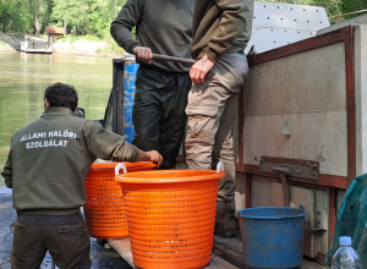Mohács has also been put on the map of Hungarian fish farming and consumption
Thanks to the domestic fish farmers and consumers, the “Szilvásvárad trout”, the “Akasztói sikiponty” or the “Balaton fish” are already on the imaginary map of Hungary, where, based on local value and quality, they try to protect and show the old tradition of fish farming and consumption. The fish festival puts Mohács on the map – said Zsolt Feldman in his speech.

(Photo: AM/Csaba Pelsőczy)
At the festival, now held for the fifth time this year, those interested could discover the diversity of fish dishes along the Danube. Mohács and the tradition of the bus tour have now become a symbol of the city. And the people of Mohács know well that maintaining traditions keeps the community alive, which is why fires are lit under the pots on the banks of the old Danube in the summer. At the event started by the German Municipality of Mohács, many fish dishes prepared along the Danube in a well-known way could be tasted at the same time and in one place.
The objective of the Agárministery is to increase the annual average fish consumption per capita
Gastronomic festivals and community events focusing on the preparation of fish contribute greatly to the Ministry of Agriculture’s goal of increasing the annual average fish consumption per capita, in addition to Hungarian fish accounting for a larger proportion of this, said the state secretary in his opening speech. He emphasized that, on the one hand, we are supporting Hungarian families, Hungarian fish producers, i.e. the national economy. On the other hand, by buying Hungarian fish, consumers can be sure that they are consuming a high-quality, controlled and produced domestic product according to strict standards, which can also support the cause of environmental protection and sustainability. Looking back at the traditions, the state secretary recalled the first Hungarian cookbook – which István Galgóczy copied from Prince Gábor Bethlen’s chef in 1622 – which accurately covered the fish dishes of the time. At that time, they were able to prepare 189 types of food from thirty types of Hungarian fish. He pointed out that there are worthy successors and messengers of Hungarian fish consumption in Mohács, which we should present to the wider world as much as possible with the festival.
In Hungary, together with our natural waters, nearly 160,000 hectares of registered fish farming water areas and around 26,000 hectares of fish ponds provide habitat for the fish population
The users of the fish farming water areas maintain good cooperation with the fish producers who provide high-quality fish supply. This ensures a production structure adapted to the needs and, in many cases, fish already under EU protection with a geographical indication. During the festival, of course, the general public could also prepare or even buy their favorite fish food from the local fishmongers. In addition to the cultural programs, representatives of the Hungarian German culture and performers from Austria also presented themselves.
AM
Related news
Tork at SIRHA Budapest: hygiene, efficiency and sustainability for the HoReCa sector
🎧 Hallgasd a cikket: Lejátszás Szünet Folytatás Leállítás Nyelv: Auto…
Read more >Improved compliance with fish stocking regulations – reporting and monitoring are a common interest
🎧 Hallgasd a cikket: Lejátszás Szünet Folytatás Leállítás Nyelv: Auto…
Read more >Related news
Historic price reduction at ALDI
🎧 Hallgasd a cikket: Lejátszás Szünet Folytatás Leállítás Nyelv: Auto…
Read more >A stable compass in the Hungarian FMCG sector for 20 years
🎧 Hallgasd a cikket: Lejátszás Szünet Folytatás Leállítás Nyelv: Auto…
Read more >








